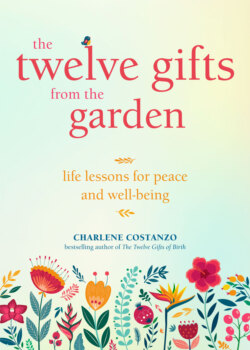Читать книгу The Twelve Gifts from the Garden - Charlene Costanzo - Страница 21
На сайте Литреса книга снята с продажи.
ОглавлениеWords of Nature, Nature of Words
Let the rain kiss you. Let the rain beat upon your head with silver liquid drops. Let the rain sing you a lullaby.
—Langston Hughes
Rain is falling, ever so softly.
I once saw rain lighter than this, so light that it sparkled. It was as if there were tiny fairies, or fireflies, or sprites in each droplet.
I later learned it can happen when several conditions are present and lined up just so. In order to see the sparkles, a person has to be in the right place at the right time as well. I’m not seeing that magical rain at the present. But, right now, I’m in a place and moment of time that feels pretty wondrous too.
I’m sitting out on a screened and covered lanai which is surrounded by a wall of tall, colorful crotons. I feel as if I’m lovingly nestled and sheltered from the rain in a private outdoor room. This feeling is reminding me of a word I just learned. It stands for the blissful tranquility that some people feel when it’s raining or storming and they are enjoying and appreciating indoor womb-like coziness. That word is chrysalism. There’s a specific word for today’s light rain too. It’s sirimiri or “drizzle” in Spanish.
I’ve recently been discovering what are sometimes called “rare” nature words. They’re rare because most people didn’t learn them growing up and they are not in common use. It’s not as if we need these words for everyday interactions; I may never use them in ordinary conversation. But I feel enriched just hearing them.
Psithurism is the sound of wind through trees. A low muffled sound like distant thunder, but thought to be caused by minor seismic tremors, is called brontide. The ultra-thin layer of glittering ice that sometimes forms on leaves, grass, and twigs is called ammil—a word that comes to us from the Devon dialect.
Another word I find fascinating is yugen. A Japanese word, said to be untranslatable, I have read that it suggests “that which is beyond what can be said,” “a profound, mysterious sense of the beauty of the universe,” “the depth of this world, as experienced through a cultivated imagination,” and “an awareness of nature, the universe, or creation that triggers emotional responses too deep and powerful for words.” Wow. That’s quite a word.
I’ve been enjoying my word research, especially words related to nature. And philosophy. But I still feel a bit frustrated because there is a word that I believe we very much need, and it does not exist. At least, I’ve been searching for several decades, and I haven’t found it yet. We don’t yet have a definitive word for the powerful resources within us.
I refer to the twelve innate qualities that I write about as “gifts.” Strength, beauty, courage, compassion, hope, joy, talent, imagination, reverence, wisdom, love, and faith are also referred to as capabilities, aptitudes, powers, essences, virtues, traits, and strengths. Because each of these words stands for a variety of things, not one of them directs our thinking precisely to these powerful “things.” Calling them strengths, which they are, is inadequate and even confusing because one of the strengths is strength. “Gifts” seems trite to some people because the word usually means material presents. And yet they are gifts. Just as they are resources, capabilities, aptitudes, powers, essences, traits, and virtues.
For centuries, philosophers, prophets, and poets have been encouraging humanity to use strength, to have courage, to love, to be compassionate, to find and develop our talent, to hold hope, to recognize beauty…to mine what’s in us for our own good and the good of all. These ideas have been discussed and debated through the ages. But what do we call this “stuff” in us that is so valuable and potentially very powerful? One thing I know it is, is a form of inner wealth. Unlike outer, worldly wealth, we all have it. And cultivating it can enrich every area of our lives.
I feel strongly that this wealth, these innate qualities, these gifts, deserve to be better recognized, appreciated, and nurtured in ourselves and in each other. When we do this, we will be greatly enriched. And I look forward to someday finally finding the right word for them.
The gentle rain seems to be subsiding. Perhaps soon I’ll be able to delight in petrichor, the earthy smell after rainfall, and enjoy komorebi, Japanese for sunlight streaming through trees.
